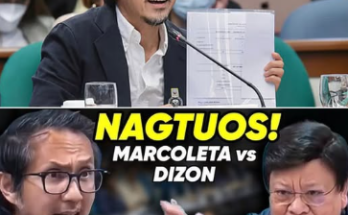
A monumental decision has just been made in the Philippines, one that promises to reshape the nation’s energy landscape and potentially unlock unprecedented economic stability. In a move that has sent ripples of surprise and, for some, outright fury across the archipelago, President Ferdinand “Bongbong” Marcos Jr. has officially signed an agreement worth a staggering $207 million. This isn’t just another government deal; it’s a groundbreaking initiative aimed at securing the country’s energy future and dramatically reducing its reliance on foreign fuel. The announcement has been met with widespread optimism by many, but it has also triggered a fierce backlash from staunch supporters of former President Duterte, known collectively as the “DDS,” who appear determined to discredit any perceived success of the current administration.
The ink is barely dry on eight new petroleum service contracts, including a historic first-of-its-kind deal for indigenous hydrogen exploration. This ambitious venture, spanning strategic locations such as Palawan, Sulu, Cagayan, Cebu, and Central Luzon, marks the largest batch of such awards in the Philippines’ history. The implications are enormous: a bolstered energy supply, a potential decrease in fuel prices for everyday Filipinos, and a significant boost to the national economy through new investments and job creation. President Marcos Jr. himself emphasized the critical need for this initiative, highlighting how deeply dependent the Philippines has been on imported oil, with a staggering 99.68% of its petroleum supply coming from abroad last year. This vulnerability, he noted, has often left ordinary Filipinos at the mercy of volatile global oil markets.
For a nation that has long grappled with fluctuating fuel costs and the economic instability they bring, this agreement represents a beacon of hope. The President’s vision is clear: to harness the country’s own natural resources, including a pioneering foray into clean, zero-carbon hydrogen energy, to create a sustainable and self-reliant energy sector. This move isn’t just about megawatts and barrels; it’s about empowering communities, fostering regional development, and providing long-term security for generations to come. The contracts are expected to attract further international partners, cementing the Philippines’ position as a serious player in the global energy arena and signaling its readiness to lead in sustainable innovations.
However, not everyone is celebrating. The loudest dissenting voices are emanating from the “DDS” camp, whose immediate reaction has been one of skepticism, denial, and even anger. According to commentators closely observing the political climate, these loyalists are reportedly furious that President Marcos Jr. is achieving tangible successes, particularly in areas that previous administrations, including that of former President Duterte, struggled with. The narrative emerging from this faction suggests a deep-seated reluctance to acknowledge any positive developments under the current leadership, often resorting to criticism and the propagation of what critics label as “fake news.”
This intense opposition underscores the deep political chasm that continues to divide the Philippines. While the current administration works to implement its economic agenda, it faces persistent efforts to undermine its achievements. The DDS, it appears, views any success by President Marcos Jr. as a direct threat to the legacy of their former leader. This sentiment, critics argue, prioritizes political allegiance over national progress, leading to an environment where constructive dialogue is often overshadowed by partisan rhetoric. For instance, the video commentary explicitly mentions how DDS supporters “don’t like this” new energy deal, despite its potential benefits for all Filipinos, because it’s a positive achievement for President Marcos Jr. They are accused of clinging to a one-sided view, only willing to praise their own chosen leader and disregarding any progress made by others.
.jpg?width=780&fit=cover&gravity=faces&dpr=2&quality=medium&source=nar-cms&format=auto)
The political tensions between the Marcos and Duterte camps have been a defining feature of the Philippine political landscape. While they once formed a powerful alliance, their relationship has deteriorated, marked by public disagreements over various issues, including confidential funds and the handling of investigations. The video commentary, for instance, touches upon the ongoing scrutiny faced by other prominent political figures, such as House Speaker Martin Romualdez, who is currently cooperating with an independent commission investigating anomalies in flood control projects. This context further illustrates the charged atmosphere in which President Marcos Jr.’s energy initiatives are being launched.
The President, meanwhile, remains focused on his agenda, pushing forward with reforms despite the constant barrage of criticism. His supporters highlight his commitment to public service and his determination to improve the lives of ordinary Filipinos. They point to efforts to stabilize prices for essential goods like rice and gasoline, arguing that these actions demonstrate a genuine concern for the welfare of the people, rather than just political posturing. The new energy deal is presented as another testament to this dedication, a strategic move to ensure long-term stability and reduce economic burdens on households and industries.
This landmark agreement is more than just a financial transaction; it’s a bold declaration of intent. It signals the Philippines’ commitment to forging its own path to energy independence and economic resilience. By tapping into its own vast resources and exploring innovative solutions like hydrogen, the nation is positioning itself for sustained growth and a stronger standing on the global stage. As the country moves towards its ASEAN chairmanship in 2026, these strategic decisions will undoubtedly play a crucial role in shaping its leadership and influence in the region.
The coming months will be critical as the Philippines embarks on this ambitious journey. The success of these energy contracts could usher in a new era of prosperity, but it will also test the nation’s political resolve against the backdrop of entrenched rivalries. Whether the benefits of this historic deal will transcend partisan divides and be embraced by all Filipinos remains to be seen. However, one thing is clear: President Marcos Jr.’s signature on these agreements has set in motion a profound transformation, one that has the entire nation, and indeed the region, watching intently. The Philippines is charting a new course, and the path ahead, while promising, will undoubtedly be fraught with challenges from those who resist change.



